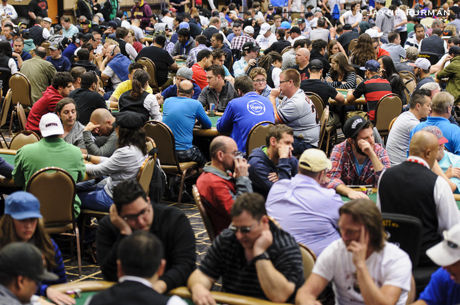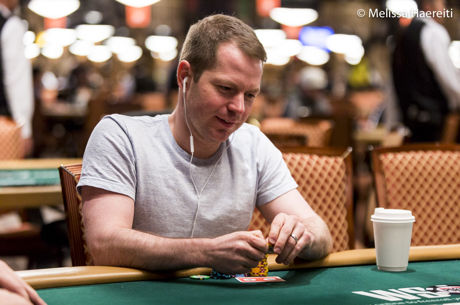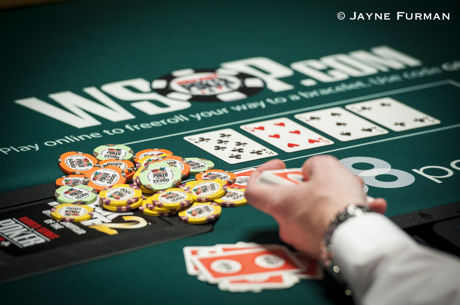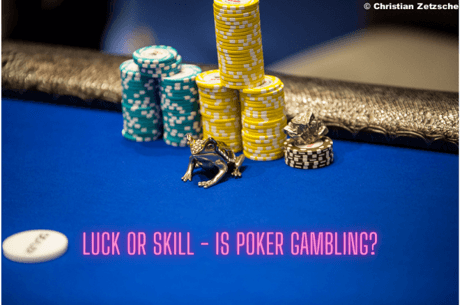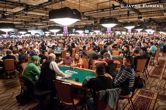10 Things to Do When You're Not in a Hand
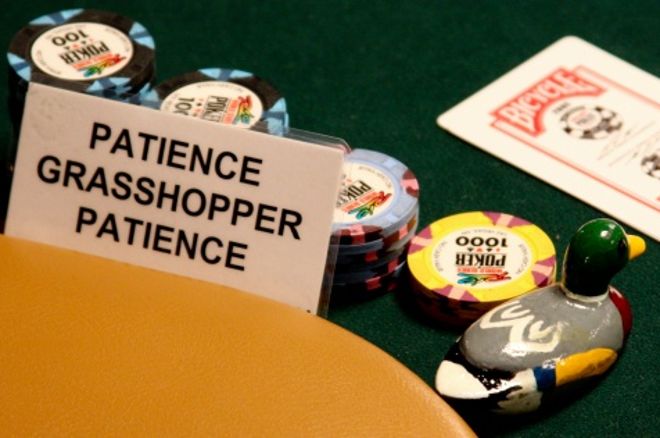
So maybe you're an online poker player, used to having at least three or four games going at once. Or maybe you're just trying to be more productive. But now you're in Las Vegas at the World Series of Poker. And though you may still go back to your room and dabble with the online action in Nevada, you figure you owe it to yourself to get the full experience of playing live.
You've been sitting in cash games in between your major tournament entries. And you're bored out of your mind! Many online poker players find frustrating the relatively slow pace of live play where you necessarily can only play one game at a time.
Here are some things you can do to keep yourself engaged and productive while you are waiting for your next hand.
1. Practice counting down the pot
Knowing the size of the pot is a crucial part of knowing the best play to make. When you play online the pot size is displayed for you right on the table. Not so in a brick-and-mortar casino. You need to do that for yourself.
Some players count the pot automatically, but most don't. That means when you're facing a tough decision that depends on this information, you have to take time to figure it out. Taking such time can make it obvious that you are facing a close call, thereby giving your opponent more information about the strength of your hand than he would otherwise have. Bad idea.
Make this task quick and simple by getting into the habit of counting the pot even when you're not in a hand. Learn to count down the pot as the hand progresses, and then make it automatic by getting into the habit of doing so.
2. Replay a hand in your head
Effective strategy depends on understanding the context of your opponent's action. Calls and raises aren't done in isolation. It can be useful sometimes to go over the action in a previous hand during those down times when you're not otherwise distracted by currently being in the hand.
While you're waiting for the next shuffle and deal, think back to a hand you were in and try to recreate the betting action, including the size of the bets, on each round of betting. The more you do this the easier it will become. You'll also find this practice helpful later when discussing and debriefing hands with fellow poker players.
3. Keep track of opponents' tendencies
Playing poker online often affords players the opportunity to see, while they're playing, many pieces of information about an opponent. Those who use a "HUD" or "heads-up display" can see instantly how often an opponent c-bets, reraises, check-folds, and so on. Such information is obviously not available in a live game, unless you use what you have observed to figure it out for yourself.
Accordingly, you should use every opportunity you have — especially when you're not in a hand — to keep track of the playing tendencies of your opponents. Rather than record this statistically (an all but impossible task for mere mortals), you should use your observations of their play to categorize them in more general ways.
For example, pay attention to how often each player seems to be in or out of a pot, calling or raising, or making straightforward plays or deceptive ones. Then use these observations to put them into broad categories of tight, loose, passive, aggressive, tricky and straightforward. It may not be as accurate or objective as a statistical display of how often they have each made certain moves, but it will help you make decisions when in a hand against them.
4. Keep track of the discards
This recommendation only applies in stud games. It's a critical skill to have when you play seven-card stud, seven-card stud hi-lo, or many rotation games like H.O.R.S.E. that include stud games.
Remembering cards does not come automatically to any but those with an eidetic memory. Unless you're already in the habit of remembering the folded cards, if you're playing a stud game, learn to do this by practicing even when you're not in a hand.
5. Put other players on hands (or hand ranges)
When you've folded, watch the play of the hand and try to figure out the hands — or range of hands — your opponents are holding. This process of deduction gets better with practice and will serve you well when you're in a hand.
6. Keep a "book" on your opponents
Take notes to keep track of how your opponents play. As discussed above, players in live games don't have the benefit of visual displays recording and showing updated information about opponents' playing inclinations. In live games, you have to do that yourself.
It can be helpful to keep a notebook in which you take notes on every player you face. This is best done, obviously, when you're not involved in a hand. Some who do this still use an old school pen and pad, but many now use their smart phones for such note-taking, which is both handy and less conspicuous-seeming. It looks like you're texting or tweeting (and thus not paying attention), when in fact you're more locked into the game and what others are doing than most.
7. Record in writing difficult decisions you made at the table
When you're not in a hand, you can occasionally use the time in between deals to record a difficult situation you had to make. Again, you can use a notepad or take a note on your smart phone. Learn to write down only that information that you'll need to trigger your memory so you can analyze the hand later when away from the table.
8. Keep a "book" on yourself
No one's play is more important to your success than your own. It's useful to have some record of how you perceive yourself to be playing.
This is true not just so you can focus on your own weaknesses and strengths. It's also critical for you to get a sense of your image in the mind of your opponent. You can take advantage of this image only if you yourself know it. Take time to think about it, reflect on it and keep track of it via notes taken between hands.
9. Make friends with the player to your left
The player to your left has the potential to be your most dangerous opponent, as he will have the most frequent opportunities to raise once you have decided to enter a hand. An opponent who has been befriended is more likely to play more softly against you. It's just human nature.
Take time in between active hands to chat with those sitting on your left and get them on your good side. It may pay dividends later.
10. Engage your opponents in conversation
Talking players often give off useful information to those who are tuned in and paying attention. They talk about bad beats, about tournaments they've been busted out of, financial pressures they may have and other potentially revealing things. They'll signal when they're getting ready to leave, what they want out of poker, their family situation and their bankrolls for the game.
All of these things (and many others I haven't mentioned) are useful clues for how such players' minds work and what they're mood may be. That information provides the thoughtful player with insights that can help you exploit them.
Therefore, if you're comfortable doing so, get your opponents talking, confiding, and revealing, and let the headphone-and-sunglasses wearing players think they look cool while they focus on their own small world. They are missing out on all of this extra information you can be mining from your opponents via conversation.
Conclusion
This list is not nearly complete. There are all sorts of other things you can do between hands. You can surely use your time to read poker literature, watch instructional videos, listen to poker podcasts or read poker strategy articles.
And lest you think I am too rigorous a task master, there's nothing wrong with using the time in between hands just to relax, take in the other games in the casino, watch a sporting event, listen to music or repeat confidence-building mantras to yourself. Some balance between mental relaxation and focus is okay. You don't want to burn out by focusing every single available minute on the business at hand.
Ashley Adams has been playing poker for 50 years and writing about it since 2000. He is the author of hundreds of articles and two books, Winning 7-Card Stud (Kensington 2003) and Winning No-Limit Hold'em (Lighthouse 2012). He is also the host of poker radio show House of Cards. See www.houseofcardsradio.com for broadcast times, stations, and podcasts.

